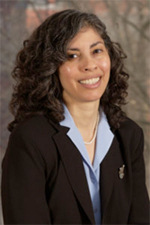 From weight loss studies to new trials for cancer treatments, human participation in research is a complex issue shaped by law, policy, science and ethics. Pilar Ossorio, Associate Professor of Bioethics and Law at the UW Law School, was appointed this month to a federal advisory committee aimed at protecting the rights of human participants in research.
From weight loss studies to new trials for cancer treatments, human participation in research is a complex issue shaped by law, policy, science and ethics. Pilar Ossorio, Associate Professor of Bioethics and Law at the UW Law School, was appointed this month to a federal advisory committee aimed at protecting the rights of human participants in research.
As a member of the Secretary's Advisory Committee on Human Research Protections (SACHRP), she is charged with looking for improvements to the current system of human research protection programs, with particular emphasis on vulnerable participants. Reporting to Health and Human Services Secretary Kathleen Sebelius, SACHRP plays an instrumental role in reviewing and revising the rules that govern human research. Current policies--such as the rules establishing project oversight or the definition of regulated research--have been in place for decades.
With regulatory changes expected soon, the appointment is a timely one for Ossorio. “These regulations, and their application and overhaul, are a subject near and dear to my heart, so I am quite excited that my appointment to the committee came at this particular time,” she says.
Ossorio has appointments at both the UW Law School and the UW School of Medicine and Public Health, and in 2011, was named the inaugural Bioethics Scholar-in-Residence at the Morgridge Institute for Research.
She received her JD from the University of California at Berkeley School of Law and her Ph.D. in Microbiology and Immunology from Stanford University. She teaches courses in torts, patent law, biotechnology regulation, and bioethics. Prior to coming to the UW in 2000, she served as Director of the Genetics Section at the Institute for Ethics at the American Medical Association.
Ossorio has worked for the federal program on the Ethical, Legal and Social Implications (ELSI) of the Human Genome Project, and with the Department of Energy’s ELSI program, and she served on the Ethics Working Group for President Clinton’s Health Care Task Force. She has participated in numerous bioethics advisory committees, and in 2011 completed her term on the National Advisory Council for Human Genome Research, another HHS appointed position.
Submitted by Law School News on October 1, 2012
This article appears in the categories: Articles